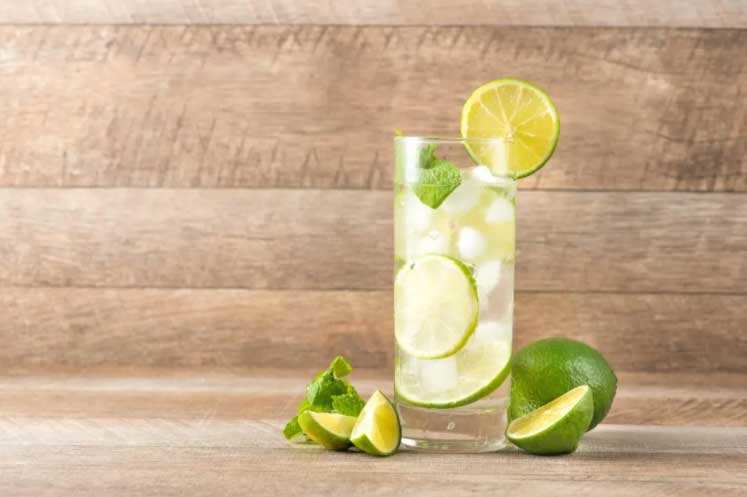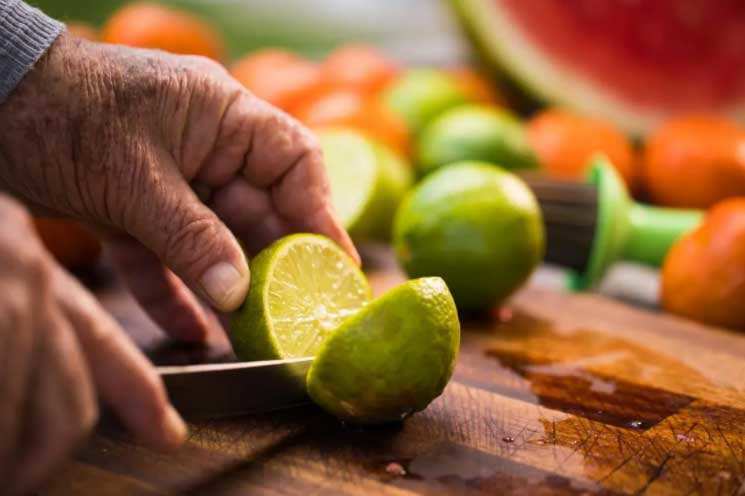
Flavoring water with citrus fruit, such as lime, can liven up a glass of water, encouraging reluctant water-drinkers to consume more.
The body needs water to survive and drinking enough is crucial for maintaining optimal health.
Water ensures the human body is adequately hydrated. People stay hydrated by drinking liquids and consuming foods with high water content.
The amount of water a person needs to drink varies according to:
- their age
- their sex
- the amount of physical activity they do
- whether someone is pregnant or breast-feeding
- the temperature and other environmental factors
- whether or not a person has a fever or diarrhea or vomiting
Many people do not drink enough water. In fact, many people drink more sweetened beverages than plain water.
Some people might find that a squeeze of lime improves the taste of the water, encouraging them to drink more of it. By drinking lime water, people can also take advantage of the many health benefits it offers.
12 Benefits Of Lime Water
This small citrus fruit with origins in Asia packs a large nutritional punch. According to the United States Department of Agriculture (USDA) , one lime with a 2-inch diameter contains just 20 calories.
The same size lime also contains the following nutrients:
- 22 milligrams (mg) calcium
- 12 mg phosphorus
- 68 mg potassium
- 19.5 mg vitamin C, which is about 20–25 percent of the daily value recommended for adults
In addition to the nutritional value of limes, lime water has the following benefits:
1. Promotes consumption of water
The Centers for Disease Control and Prevention (CDC) suggest that people who do not drink enough water could add a squeeze of lime to enhance the flavor, which may encourage them to drink more water.
2. Helps improve diet
A recent study in Nutritional Epidemiology showed that people who drank more water instead of sugary drinks, such as soda or juice, improved their diet.
People who drank water instead of sweetened drinks reduced the amount of sugar and fat they consumed on a daily basis.
3. May aid digestion
Adding lime to water can help aid digestion. Limes contain compounds that help stimulate digestive secretions in the stomach. Also, the acid in the lime juice helps the saliva break down food.
4. Reduces cancer chances
Several studies show a link between citrus fruit and a reduced risk of some types of cancer. A 2015 study in Medicine (Baltimore) showed a possible link between increased citrus fruit consumption and a diminished risk of esophageal cancer. However, more research is required.
5. Improves skin quality
Limes contain vitamin C and antioxidants, both of which are ingredients in many commercial skin products. When consumed with water, the natural ingredients in the lime juice can help improve the appearance of aging skin.
6. Promotes weight loss
Nutritionists often recommend drinking a glass of water with a meal to help prevent overeating.
Lime water has an additional benefit. The citric acid found in lime juice helps boost a person’s metabolism, helping them burn more calories and store less fat.
7. Improves immune system
The vitamin C combined with the antioxidants contained in limes provide support to the body’s immune system.
When drunk regularly, lime water might help prevent and shorten the lifespan of colds and cases of flu.
8. Reduces risk of heart disease
Limes contain high levels of magnesium and potassium.
Both of these elements help support the overall health of the heart. In particular, potassium can improve blood flow and reduce blood pressure.
There is also limited research indicating that limes may also help reduce cholesterol levels.
9. Lowers blood sugar
According to some research, vitamin C can help lower morning and post-meal blood sugar changes. Though the study focused on people taking supplements of vitamin C, the conclusion indicated that vitamin C offers excellent potential for improving a person’s sugar levels.
10. Prevents the growth of micro-organisms
According to some research, the limonins found in limes can help prevent the accumulation of Streptococcus bacteria.
Streptococcus is a type of bacteria responsible for a variety of infections and health conditions, including respiratory and mouth infections.
Drinking lime water may help stop these harmful organisms from developing and prevent bacterial illnesses.
11. Has anti-inflammatory properties
Limes provide a good source of vitamin C. Among many other potential benefits, vitamin C acts as an anti-inflammatory agent in the body.
Oregon State University conducted a review of research that focused on the positive effect vitamin C has on reducing inflammation.
They concluded that the majority of studies indicated that the use of vitamin C showed favorable results in reducing inflammation.
12. Helps prevent kidney stones
Limes contain both citric acid and vitamin C. A 2014 study showed that both vitamin C and citric acid helped break up or prevent the formation of some types of kidney stones.
The researchers concluded that by including vitamin C and citric acid in their diet, a person could reduce their risk of developing specific stones again in the future.
How To Make Lime Water

Lime water is easy to make:
- Wash a fresh lime before cutting it.
- Fill a glass with water and squeeze the juice from a piece of the lime into the water.
- To make lime water ahead of time, fill a pitcher with water and squeeze in the juice of a whole lime.
- Add lime slices to the pitcher for added flavor.
- Drink the water within 1 day for best flavor.
Takeaway
For people who have trouble drinking the recommended amount of water each day, lime water may be a good alternative.
In addition to extra flavor, lime water also offers additional nutrients that may have a variety of health benefits.
Lime water is easy to prepare, and almost everyone can add it to their diet.
Sources:
- An, R., & McCaffrey, J. (2016, February 22). Plain water consumption in relation to energy intake and diet quality among US adults, 2005–2012 [Abstract]. Journal of Human Nutrition and Dietetics, 29(5), 624–632
https://onlinelibrary.wiley.com/doi/full/10.1111/jhn.12368 - Basic report: 09159, Limes, raw. (2018, April)
https://ndb.nal.usda.gov/ndb/foods/show/09159?fgcd=&manu=&format=&count=&max=25&offset=&sort=default&order=asc&qlookup=lime&ds=&qt=&qp=&qa=&qn=&q=&ing= - Dakhale, G. N., Chaudhari, H. V., & Shrivastava, M. (2011, December 28). Supplementation of vitamin C reduces blood glucose and improves glycosylated hemoglobin in type 2 diabetes mellitus: A randomized, double-blind study. Advances in Pharmacological Sciences
https://www.ncbi.nlm.nih.gov/pmc/articles/PMC3254006/ - Gul, Z., & Monga, M. (2014, December). Medical and dietary therapy for kidney stone prevention. Korean Journal of Urology, 55(12), 775–779
https://www.ncbi.nlm.nih.gov/pmc/articles/PMC4265710/ - Inflammation. (n.d.)
http://lpi.oregonstate.edu/mic/health-disease/inflammation - Manners, G. D. (2007, October 17). Citrus limonoids: Analysis, bioactivity, and biomedical prospects [Abstract]. Journal of Agricultural and Food Chemistry, 55(21), 8285–8294
https://www.ncbi.nlm.nih.gov/pubmed/17892257 - Popkin, B. M., D’Anci, K. E., & Rosenberg, I. H. (2011, August 1). Water, hydration, and health. Nutrition Reviews, 68(8), 439–458
https://www.ncbi.nlm.nih.gov/pmc/articles/PMC2908954/ - Subramenium, G. A., Vijayakumar, K., & Pandian, S. K. (2015, August 1). Limonene inhibits streptococcal biofilm formation by targeting surface-associated virulence factors. Journal of Medical Microbiology, 64(8), 879–890
http://www.microbiologyresearch.org/docserver/fulltext/jmm/64/8/879_jmm000105.pdf?expires=1531888996&id=id&accname=guest&checksum=0E2CD46E7AEF251DF8DB0786429D776B - Wang, A., Zhu, C., Fu, L., Wan, X., Yang, X., Zhang, H., … Zhao, H. (2015, October 2). Citrus fruit intake substantially reduces the risk of esophageal cancer: A meta-analysis of epidemiologic studies. Medicine, 94(39), e1390
https://www.ncbi.nlm.nih.gov/pmc/articles/PMC4616874/ - Water & nutrition. (2016, October 5)
https://www.cdc.gov/healthywater/drinking/nutrition/index.html
Important Notice: This article was originally published at www.medicalnewstoday.com by Jenna Fletcher where all credits are due. Medically reviewed by Natalie Butler, R.D., L.D.
Disclaimer
The watching, interacting, and participation of any kind with anything on this page does not constitute or initiate a doctor-patient relationship with Dr. Farrah®. None of the statements here have been evaluated by the Food and Drug Administration (FDA). The products of Dr. Farrah® are not intended to diagnose, treat, cure, or prevent any disease. The information being provided should only be considered for education and entertainment purposes only. If you feel that anything you see or hear may be of value to you on this page or on any other medium of any kind associated with, showing, or quoting anything relating to Dr. Farrah® in any way at any time, you are encouraged to and agree to consult with a licensed healthcare professional in your area to discuss it. If you feel that you’re having a healthcare emergency, seek medical attention immediately. The views expressed here are simply either the views and opinions of Dr. Farrah® or others appearing and are protected under the first amendment.
Dr. Farrah® is a highly experienced Licensed Medical Doctor certified in evidence-based clinical nutrition, not some enthusiast, formulator, or medium promoting the wild and unrestrained use of nutrition products for health issues without clinical experience and scientific evidence of therapeutic benefit. Dr. Farrah® has personally and keenly studied everything she recommends, and more importantly, she’s closely observed the reactions and results in a clinical setting countless times over the course of her career involving the treatment of over 150,000 patients.
Dr. Farrah® promotes evidence-based natural approaches to health, which means integrating her individual scientific and clinical expertise with the best available external clinical evidence from systematic research. By individual clinical expertise, I refer to the proficiency and judgment that individual clinicians acquire through clinical experience and clinical practice.
Dr. Farrah® does not make any representation or warranties with respect to the accuracy, applicability, fitness, or completeness of any multimedia content provided. Dr. Farrah® does not warrant the performance, effectiveness, or applicability of any sites listed, linked, or referenced to, in, or by any multimedia content.
To be clear, the multimedia content is not intended to be a substitute for professional medical advice, diagnosis, or treatment. Always seek the advice of your physician or other qualified health providers with any questions you may have regarding a medical condition. Never disregard professional medical advice or delay in seeking it because of something you have read or seen in any website, video, image, or media of any kind. Dr. Farrah® hereby disclaims any and all liability to any party for any direct, indirect, implied, punitive, special, incidental, or other consequential damages arising directly or indirectly from any use of the content, which is provided as is, and without warranties.








